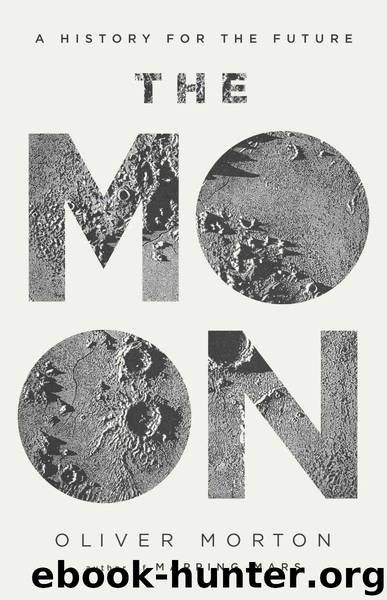The Moon (Economist Books) by Morton Oliver

Author:Morton, Oliver [Morton, Oliver]
Language: eng
Format: azw3
Publisher: PublicAffairs
Published: 2019-06-03T16:00:00+00:00
- V -
REASONS
IT WAS WONDERFUL: PARENTS CAME TO PULL US TOWARDS THE televisions, which like the Moon were black and white and really, mostly, grey. Or they took us outside and pointed up at the sky. Or both. Sky Moon and screen Moon both there and both theirs and both ours, too; some large, strange change was being shared. Something grown-up that applied to children, too, and to what adults wish children to be.
Not all parents; not all of those of us then children. Not, for everyone, the most important thing or even a thing at all. For some an alienation, or a waste. But for many that encounter with history stayed bright, and for some it went deep. The excited adult pointing up promised a larger world that was yet to come, a world of the sky beyond the screen and the space in between for us to grow into.
We did not know that only 15 Saturn Vs had been built or that there were only nine left. We did not know that the last three Apollo missions were to be cancelled (“I just don’t want to take the risk of a possible goof off,” said President Nixon). We did not know that the USSR, having failed to build a successful Saturn-class super booster of its own, had no plans to put its own people on the Moon, or anywhere beyond low-Earth orbit, or that no one else was in a position to plan at all. We did not appreciate that, for all the excitement of 1969, the American public had never been overwhelmingly keen on Moon missions and that other priorities were looming larger, with price tags of their own. The Moonworld was there for everyone, a future history which, our parents seemed to promise us, would grow up as we did.
And then it didn’t.
It is not that nothing happened. NASA built its space shuttles, and flew more than 100 missions with them, losing two orbiters and 14 souls in the process. America and Russia, in post–Cold War partnership with the European Space Agency, the Japanese and the Canadians, built an ambitious international space station, called it the International Space Station and have kept crews on it continuously for 18 years at the time of writing. For most of that time, rovers trundled across the deserts of Mars, geologizing as they went and the Cassini orbiter danced among Saturn’s moons and rings. Communication satellites became a big business; space became vital to commerce, and to the military.
But it was never enough for the people sometimes called the “orphans of Apollo”—the children of the late 1960s for whom space remains an inspiration and a disappointment. The fact that Apollo had not seemed to come to anything may have disappointed many, but most of them don’t regularly, or ever, give it a thought. For some, though, the curtailment of the space programme felt, as they came of age, like something between a bereavement and a betrayal. These were the people
Download
This site does not store any files on its server. We only index and link to content provided by other sites. Please contact the content providers to delete copyright contents if any and email us, we'll remove relevant links or contents immediately.
| Aeronautics & Astronautics | Astronomy |
| Astrophysics & Space Science | Comets, Meteors & Asteroids |
| Cosmology | Mars |
| Solar System | Star-Gazing |
| Telescopes | UFOs |
Tools of Titans by Timothy Ferriss(8373)
Turbulence by E. J. Noyes(8042)
Secrets of Antigravity Propulsion: Tesla, UFOs, and Classified Aerospace Technology by Ph.D. Paul A. Laviolette(5370)
Astrophysics for People in a Hurry by Neil DeGrasse Tyson(5185)
Room 212 by Kate Stewart(5107)
Design of Trajectory Optimization Approach for Space Maneuver Vehicle Skip Entry Problems by Runqi Chai & Al Savvaris & Antonios Tsourdos & Senchun Chai(5067)
Pale Blue Dot by Carl Sagan(5002)
The David Icke Guide to the Global Conspiracy (and how to end it) by David Icke(4712)
A Journey Through Divination and Astronomy by Publishing Pottermore(4384)
Goodbye Paradise(3804)
Apollo 8 by Jeffrey Kluger(3707)
COSMOS by Carl Sagan(3621)
The Five People You Meet in Heaven by Mitch Albom(3562)
Losing the Nobel Prize by Brian Keating(3534)
How to Read Water: Clues and Patterns from Puddles to the Sea (Natural Navigation) by Tristan Gooley(3466)
Brief Answers to the Big Questions by Stephen Hawking(3430)
How to Read Nature by Tristan Gooley(3338)
The Order of Time by Carlo Rovelli(3190)
A Brief History of Time by Stephen Hawking(3023)
